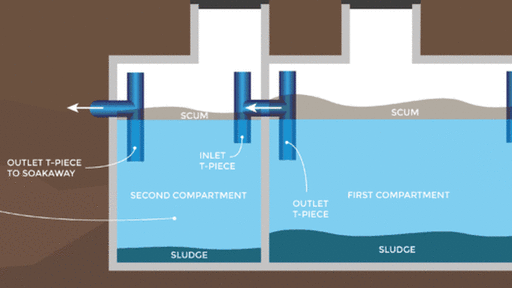My septic tank discharges into a ditch. Is this ok?

Many people are not sure what type of off mains drainage system they have. After all, it can be pretty tricky working it out since they are tucked neatly away underground. And if the system is working as it should do, most people are happy to leave it well alone.
There are three main different types of off mains drainage tank - a septic tank, a sewage treatment plant and a cesspit. Septic tanks and sewage treatment plants will then have an outlet pipe which runs from the tank, and which typically takes some of the waste water and discharges it either into the ground, or to a local watercourse or ditch. If you have a septic tank which discharges into a ditch, is this ok?
The waste from most septic tanks flows to a soakaway system or a drainage field. A drainage field is typically a network of perforated or slotted pipes which allow waste water from the septic tank to percolate through and into the surrounding sub soils. A soakaway can be any other type of system which allows wastewater to pass into the ground, such as a bore hole soakaway or soakaway chamber. This provides a form of treatment of the waste water, which can then pass into the soil. If your septic tank doesn't have a drainage field or soakaway system, the waste water will instead flow through a sealed pipe and empty straight into a ditch or a local water course.
So, is it a problem if your septic tank discharges into a ditch?
In a word, yes. The problem is that the waste water that comes from septic tanks is no longer considered safe to pass straight into local watercourses or ditches without any form of treatment. A soakaway system or drainage field provides a form of treatment, so the waste water doesn't cause a pollution. But a sealed pipe will literally take the untreated waste straight to its destination, and into the local environment where it can cause real issues.
Septic tanks don't actually provide any treatment of the waste that flows into them. All that happens is that the waste settles into three different layers, and the middle layer of separated waste water is what passes through into the drainage field or soakaway system. Compare this to a sewage treatment plant, which does provide treatment of the waste, meaning that what leaves the tank is cleaner and able to pass straight into a ditch or watercourse without any issues (assuming that it's working as it should be).
You are no longer allowed to have a septic tank which discharges into a ditch or a local watercourse. If you have a septic tank, it must connect to a soakaway system which is appropriate to your property and the ground conditions. In recent years, you were only made to take action to remedy this if your system was found to be causing a pollution. But the General Binding Rules which are currently in force dictate that anyone with a septic tank which discharges into a ditch must upgrade their system by January 2020. The legislation also states that if you are selling your property before 2020, the system must be upgraded as part of the sale.
How do I know if my septic tank discharges to a ditch?
It's not easy to tell, because the system is underground. If a ditch runs close to your property, you can take a look to see if you can spot the end of the outlet pipe which would run from your septic tank, and which is often visible.
You can also take a look in the manhole after your septic tank, which is usually a distribution chamber. If you see a number of different entrances to pipes, this more than likely indicates that your septic tank connects to a soakaway system instead. Please be careful though if you do take a look, manhole covers can be very heavy to lift!
The best way to know for sure is for a local specialist to investigate and confirm this for you. If you're due to have your tank emptied, why not get in touch and arrange a Septic Tank Health Check with one of our team of engineers? They can confirm the type of system you have in place, as well as checking the condition of the tank and the pipe work. Call our team today to find out more on 0800 028 9903 or send us a message.
What are my options if my septic tank discharges into a ditch?
You have two options:
- Replace the pipe which runs to the ditch or watercourse with a drainage field. You'll need percolation tests to be undertaken first. These are really important because they will tell you whether the ground at your property is appropriate - and if so, what size of drainage field it needs to be.
- Replace the septic tank with a sewage treatment plant.
Cost-wise, it's not possible to say which of the above options would be the most cost effective. This is because so much rests on the ground conditions at your property as to what size of drainage field you might need - and therefore how much it might cost to install. If you need a large drainage field, you may find that a sewage treatment plant is more cost effective. Of course, there are a range of prices for sewage treatment plants, so it's worth getting advice on the right one for your property.
We know that the world of septic tank regulations can be a little mind boggling, so we have produced a quick and easy guide for property owners.
So, if your septic tank discharges into a ditch, you'll need to take action.
If you are a landowner or a property manager with responsibility for multiple rural properties, we can manage everything for you - from checking compliance with septic tank regulations, through to arranging any works required to bring properties in line with the rules. Contact our team today on 0800 028 9903 or send us a message here for more information.
Let's stay in touch! Sign up for our helpful newsletter today

Sam's career prior to UKDP was spent in the marketing and service industries, so she is focused on making sure we look after our customers – and getting the UKDP message out there! Sam has overall responsibility for business operations and for delivering the best customer service we can.


